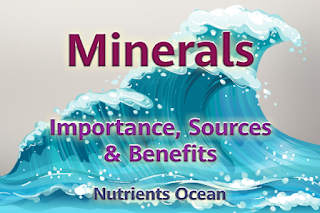
Minerals
In the intricate web of nutrition, minerals play a pivotal role,often overlooked but crucial for maintaining optimal health. These vital nutrients
are the unsung heroes behind various bodily functions, from supporting strong bones to aiding nerve function. Let’s delve into
the significance, sources, and benefits of minerals for human health, uncovering why they are indispensable for our well-being.
are the unsung heroes behind various bodily functions, from supporting strong bones to aiding nerve function. Let’s delve into
the significance, sources, and benefits of minerals for human health, uncovering why they are indispensable for our well-being.
Importance of Minerals
Minerals are the bedrock of human health, acting as catalysts for enzyme reactions, maintaining fluid balance, and forming structural components of tissues and bones. They are classified into two categories: major minerals (those needed in larger quantities) and trace minerals (required in smaller amounts). Each mineral contributes uniquely to bodily functions, underscoring their irreplaceable importance.
Sources of Minerals
Fortunately, nature has provided an abundant array of mineral sources, ensuring accessibility for everyone. Here are some common sources of essential minerals:
1. Calcium: Calcium is vital for human health, essential for bones, teeth, muscle, nerve, and heart function. It supports blood clotting, hormone secretion, and enzyme activation, emphasizing its importance for overall well-being.
Found in dairy products, leafy greens, and fortified foods, calcium is essential for bone health and muscle function.
2. Iron: Iron is vital for human health, transporting oxygen via hemoglobin, supporting energy production, and maintaining healthy blood cells. It’s crucial for preventing anemia, supporting cognitive function, immune response, and regulating body temperature, emphasizing its importance for overall well-being.
Red meat, poultry, beans, and fortified cereals are rich sources of iron, vital for transporting oxygen in the blood and reventing anemia.
3. Potassium: Potassium is vital for human health, regulating fluid balance, nerve transmission, and muscle function. It supports cardiovascular health by managing blood pressure and reduces the risk of stroke and heart disease.
Additionally, it aids bone health, kidney function, and protein synthesis, emphasizing its importance for overall well-being.
Bananas, potatoes, avocados, and spinach are excellent sources of potassium, crucial for maintaining healthy blood pressure and nerve function.
4. Magnesium: Magnesium is vital for human health, supporting over 300 biochemical reactions. It’s essential for muscle, nerve, and bone function, as well as regulating blood sugar, pressure, and heart rhythm. Magnesium also impacts mood, cognition, and protein synthesis, emphasizing its role in overall well-being.
Nuts, seeds, whole grains, and leafy greens are packed with magnesium, essential for energy production, muscle function, and bone health.
5. Zinc: Zinc is vital for human health, essential for immune function, wound healing, DNA synthesis, and hormone regulation. It supports sensory functions, tissue repair, and growth, emphasizing its importance in maintaining overall well-being.
Oysters, red meat, poultry, and beans are abundant sources of zinc, vital for immune function, wound healing, and DNA synthesis.
6. Selenium: Selenium is crucial for human health as a potent antioxidant, defending cells from damage and inflammation. It supports thyroid function, aiding in hormone production for metabolism, and boosts the immune system, guarding against infections. Its essential role spans heart health, cognitive function, and cancer prevention.
Brazil nuts, seafood, whole grains, and eggs are rich in selenium, an antioxidant that supports thyroid function and protects against oxidative stress.
8. Copper: Copper is vital for human health, essential for enzyme function, immune support, and collagen formation. It aids iron absorption, red blood cell production, and brain function, emphasizing its importance for overall well-being.
Food sources of copper include nuts (such as almonds and cashews), seeds (like sunflower seeds), whole grains (such as oats and barley), seafood (including oysters and crabs), leafy greens (like spinach and kale), beans (such as lentils and chickpeas), organ meats (like liver), and dark chocolate. Incorporating these foods into your diet can help ensure an adequate intake of copper to support overall health and well-being.
9. Phosphorus: Phosphorus contributes to bone and teeth strength, aids in energy metabolism, supports cell structure and function, and helps regulate acid-base balance in the body.
Phosphorus is found abundantly in protein-rich foods like meat, fish, dairy, nuts, and seeds. Adequate phosphorus intake is necessary for maintaining optimal health, as deficiency can lead to weakened bones, fatigue, and compromised cellular function.
10.
Sodium:
Sodium is a critical mineral that plays a vital role in maintaining
various bodily functions. It helps regulate fluid balance, nerve
transmission, and muscle contraction, ensuring proper hydration, nerve
signaling, and muscle function. Additionally, sodium plays a crucial
role in maintaining blood pressure levels within a healthy range.
However, while sodium is essential, it’s important to consume it in
moderation, as excessive intake can lead to adverse health effects such
as high blood pressure and cardiovascular issues. Therefore, striking a
balance in sodium consumption is key to supporting overall health and
well-being.
11.
Iodine:
maintaining overall health. It is particularly important for the
proper functioning of the thyroid gland, which regulates metabolism,
energy production, and growth. Adequate iodine intake is also vital
for cognitive function, as it supports brain development and mental
clarity. Furthermore, iodine is necessary for immune system function,
helping to defend the body against infections and diseases. Despite
its importance, many people worldwide suffer from iodine deficiency,
which can lead to various health issues. Therefore, ensuring
sufficient iodine intake through diet or supplementation is essential
for optimal health and well-being.
Benefits of Minerals for Human Health
The benefits of minerals span across every aspect of health and well-being. Here are some key advantages:
1. Strong Bones and Teeth: Calcium, phosphorus, and magnesium are essential for building and maintaining strong bones and teeth, reducing the risk of osteoporosis and dental issues.
2. Optimal Nerve Function: Minerals like potassium, sodium, and magnesium play a crucial role in nerve signaling, ensuring proper communication between the brain and the rest of the body.
3. Healthy Heart: Potassium, magnesium, and calcium contribute to maintaining a healthy heart rhythm, regulating blood pressure, and supporting cardiovascular function.
4. Improved Immunity: Minerals such as zinc, selenium, and iron are vital for a robust immune system, helping the body fend off infections and illnesses.
5. Energy Production: Magnesium and iron are key players in energy metabolism, facilitating the production of ATP adenosine triphosphate), the body’s primary energy currency.
6. Cellular Function: Trace minerals like copper, zinc, and selenium are essential for enzyme function and antioxidant defense, safeguarding cells from damage and supporting overall health.
In conclusion, minerals are the cornerstone of human health, with each playing a unique and indispensable role in maintaining optimal bodily functions. By incorporating a diverse array of mineral-rich foods into our diets, we can ensure that our bodies receive the nourishment they need to thrive. Let’s embrace the power of minerals and unlock their full potential for a healthier, happier life.



